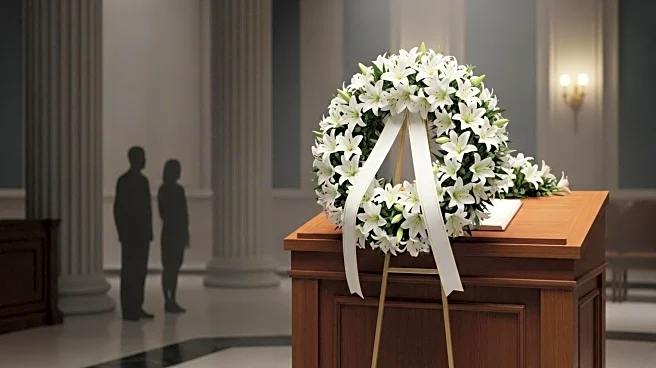What's Happening?
The funeral of Charlie Kirk, a prominent conservative activist and founder of Turning Point USA, took place at the Arizona Cardinals' stadium in Glendale, Arizona. The event drew over 200,000 mourners, filling the stadium to capacity. Kirk was assassinated on September 10 while speaking at a Utah college campus during his American Comeback Tour. The funeral featured speeches from President Trump, Vice President JD Vance, and Kirk's widow, Erika Kirk, among others. The ceremony was marked by a mix of somber reflection and fiery tributes, emphasizing Kirk's influence and legacy in conservative circles.
Why It's Important?
Charlie Kirk was a significant figure in conservative activism, known for his role in founding Turning Point USA, an organization aimed at promoting conservative values among young Americans. His assassination has sent shockwaves through the political community, highlighting the risks faced by public figures in polarized environments. The large turnout at his funeral underscores his impact and the strong support he garnered. The event also serves as a platform for conservative leaders, including President Trump and Vice President Vance, to rally support and reinforce their political messages, potentially influencing future political dynamics and strategies within the conservative movement.
What's Next?
Following the funeral, there may be increased efforts to honor Charlie Kirk's legacy through continued activism and expansion of Turning Point USA's initiatives. Political leaders who spoke at the event, including President Trump and Vice President Vance, may leverage the momentum to further their agendas and strengthen their positions within the conservative movement. Additionally, the assassination could prompt discussions on security measures for public figures and the need for addressing political violence.
Beyond the Headlines
The assassination of Charlie Kirk raises broader questions about the state of political discourse and safety in the United States. It highlights the potential dangers faced by activists and public figures in an increasingly divided political landscape. The event may lead to calls for more robust security protocols and a reevaluation of how political disagreements are handled in public forums. Furthermore, it could spark debates on the role of rhetoric in inciting violence and the responsibilities of political leaders in fostering a more civil and respectful dialogue.










